Saving the planet from a climate change tipping point that will trigger social collapse and widespread human death from fires, floods, and starvation requires urgent global action. Oil companies are not going to voluntarily stop extracting and burning fossil fuels for profit, so it’s up to politicians and regulators to step in and stop them.
In the U.S., a portion of the Democratic Party has acknowledged the importance of having policymakers not be captured by the oil industry. More than 40 House Democrats have voluntarily pledged to reject any campaign money from the industry’s PACs, executives, or lobbyists, insulating themselves from the potential influence of those financial favors and demonstrating to voters that they take this issue seriously.
But the House Democrats’ campaign fundraising arm has embraced oil lobbyist money. So far this year, the Democratic Congressional Campaign Committee’s (DCCC) largest bundler of campaign funds is Zachary Pfister, a lobbyist for the American Petroleum Institute (API) trade association that promotes the interests of member companies including ExxonMobil, Chevron, ConocoPhillips, and Marathon Petroleum. Pfister has given the DCCC $148,000 in bundled checks so far this year, according to FEC filings. Since 2018, he has given the group $966,750 in contributions. Bundling checks is a way for lobbyists to attach their names to large sums of money that they can offer as a benefit for the politicians and political party groups they are trying to influence for legislative favors. The money comes from their clients and other individuals and groups in their networks, thereby allowing them to give amounts far in excess of the legal maximum for an individual that is currently set at $36,500 per year.



